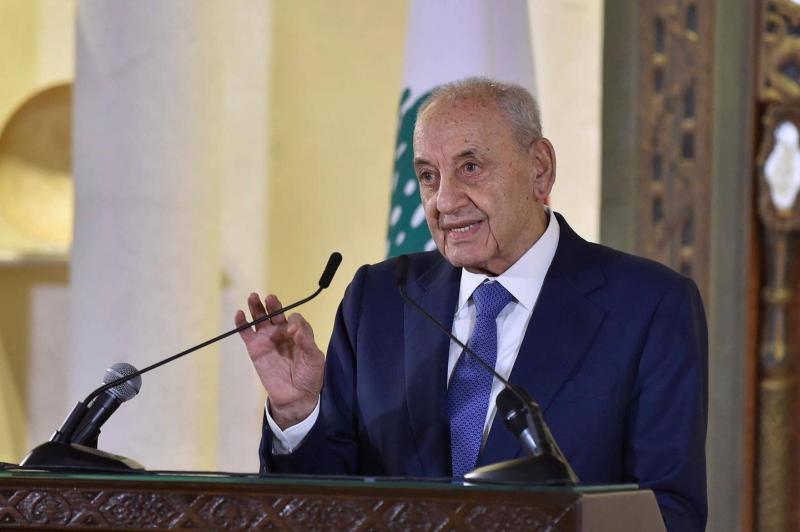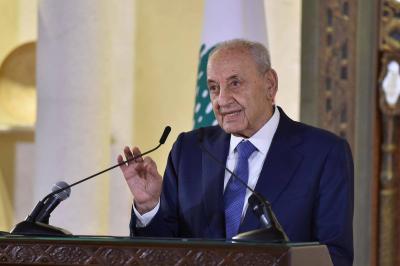Speaker of the House Nabih Berri held a press conference at the second presidency headquarters in Ain el-Tineh, in the presence of members of the leadership body of the Amal Movement, dedicated to the upcoming parliamentary elections. He clarified the stance of the movement and the "Development and Liberation" bloc regarding several political issues, especially regarding the elections, their timing, border delineation, and living conditions.
President Berri confirmed that "the parliamentary elections will take place on their scheduled date, May 15, after the doors for amendments have fallen." He pointed out that "some foreign entities are financing some local parties to turn all legitimate demands into votes in the ballot boxes to achieve political and strategic agendas aimed at changing the face of Lebanon, its identity, choices, and constants through the electoral process,” describing this external intervention as "an event that is masquerading as a rightful endeavor but is aimed at achieving a wrongful outcome." He emphasized that "the voices of competing candidates should not be louder than the voices of the vast majority of Lebanese who have fallen below the poverty line," asserting the need for "the voice of the Lebanese to reach the executive authority and the government before reaching the ballot boxes," urging the government to "work on completing the necessary measures to enhance social, living, health, and security stability before it's too late."
On the topic of maritime border delineation, Berri reiterated that "there will be no squandering, concession, or compromise on any drop of water or cubic meter of resources," judging the framework agreement as "the available mechanism for continuing indirect negotiations to complete the delineation of borders with occupied Palestine," stressing that "the delineation request is a sovereign matter that should not be interconnected with any other local or constitutional duties."
He addressed the gathered audience, members of the media, and through them to all Lebanese Muslims and Christians, wishing to derive from the blessed occasions of Isra and Mi'raj and the Prophet's mission, the values of love, unity, dialogue, and respecting human dignity. He expressed hope that these occasions would return to the Lebanese whenever Lebanon transcends its current hardships and crises, becoming more united, shining, and prosperous.
Berri noted, "March is also a month of pride, resistance, and renewal for our martyrs." He commemorated numerous martyrs from different regions and honored them for their sacrifices and contributions to creating a free and independent Lebanon.
He articulated that this meeting is specifically to present the Amal Movement and Development and Liberation bloc's approach and vision for the legislative elections on May 15. He emphasized that this upcoming electoral process is not the first for Lebanon since the Taif Agreement but is marked by an unprecedented level of international and regional interest in this constitutional event, highlighting Lebanon's significant role and message.
Despite the threat of a third world war or a potential settlement, he remarked that global interests in this electoral process have not diminished. Berri pointed out challenges, including attempts to exploit people's suffering and sacrifices leading to significant social crises, advocating for a collective national effort for Lebanon's future.
Berri listed the broad outlines of their electoral program under the slogan “Together we hope to save Lebanon," which includes:
1. Commitment to the constitution and the implementation of unfulfilled reform provisions from the Taif Agreement.
2. Stance against any form of division threatening Lebanon's unity.
3. Work with all political blocs for a transition from a sectarian state to a modern civil state.
4. Eliminating electoral laws that enshrine sectarianism and advocating for a proportionality-based election law.
5. Transitioning from a rentier economy to a productive one while preserving depositors' rights.
6. Protecting Lebanon's natural resources, maintaining a firm stance on maritime boundary negotiations.
7. Support for expanded administrative decentralization as stipulated in the Taif Agreement.
8. Upholding laws that guarantee depositors' rights.
9. Demand for accountability for the Beirut port explosion and the related tragedies.
10. Commitment to the case of Imam Moussa Sadr as a national cause transcending sectarian lines.
Berri announced the approved candidates for the "Development and Liberation" list and expressed hope for their success in the elections.
He reaffirmed the strength and resilience of Amal's supporters, encouraging them to embody their commitment both in resistance and in democratic participation, with a call to unite on May 15 to reflect their loyalty to their heritage and history.




